Affiliate links on Android Authority may earn us a commission. Learn more.
Galaxy S10 Plus vs Pixel 3 XL: The battle for Android's soul rages on
Published onFebruary 22, 2019
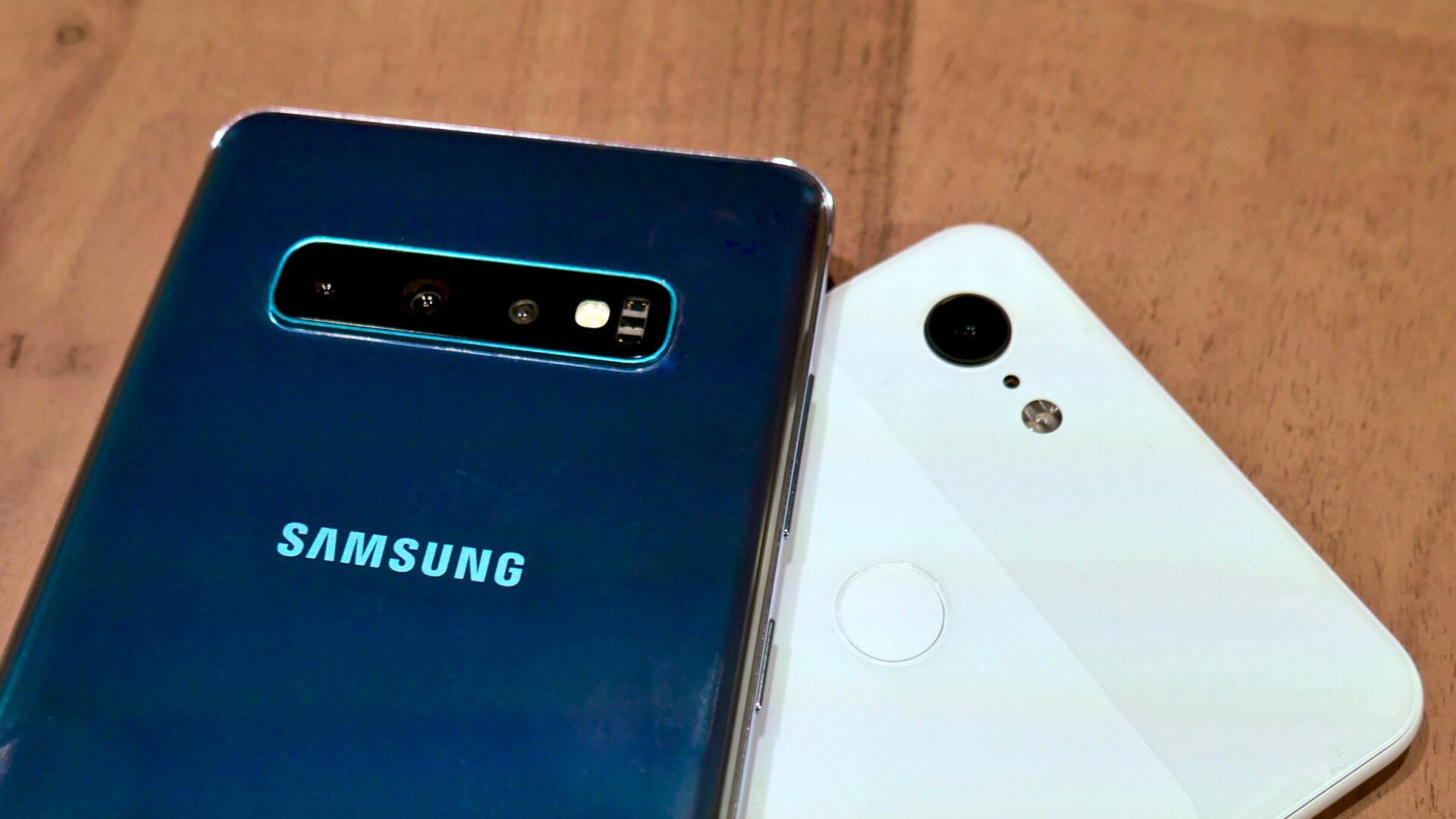
Android may be owned by Google, but for millions around the world the brand is synonymous with Samsung’s Galaxy phones.
Google has its own unique vision of Android with the Pixel series that’s currently in its third generation. Samsung’s flagship Galaxy S series has been around for much longer, celebrating its tenth anniversary with the newly announced Samsung Galaxy S10.
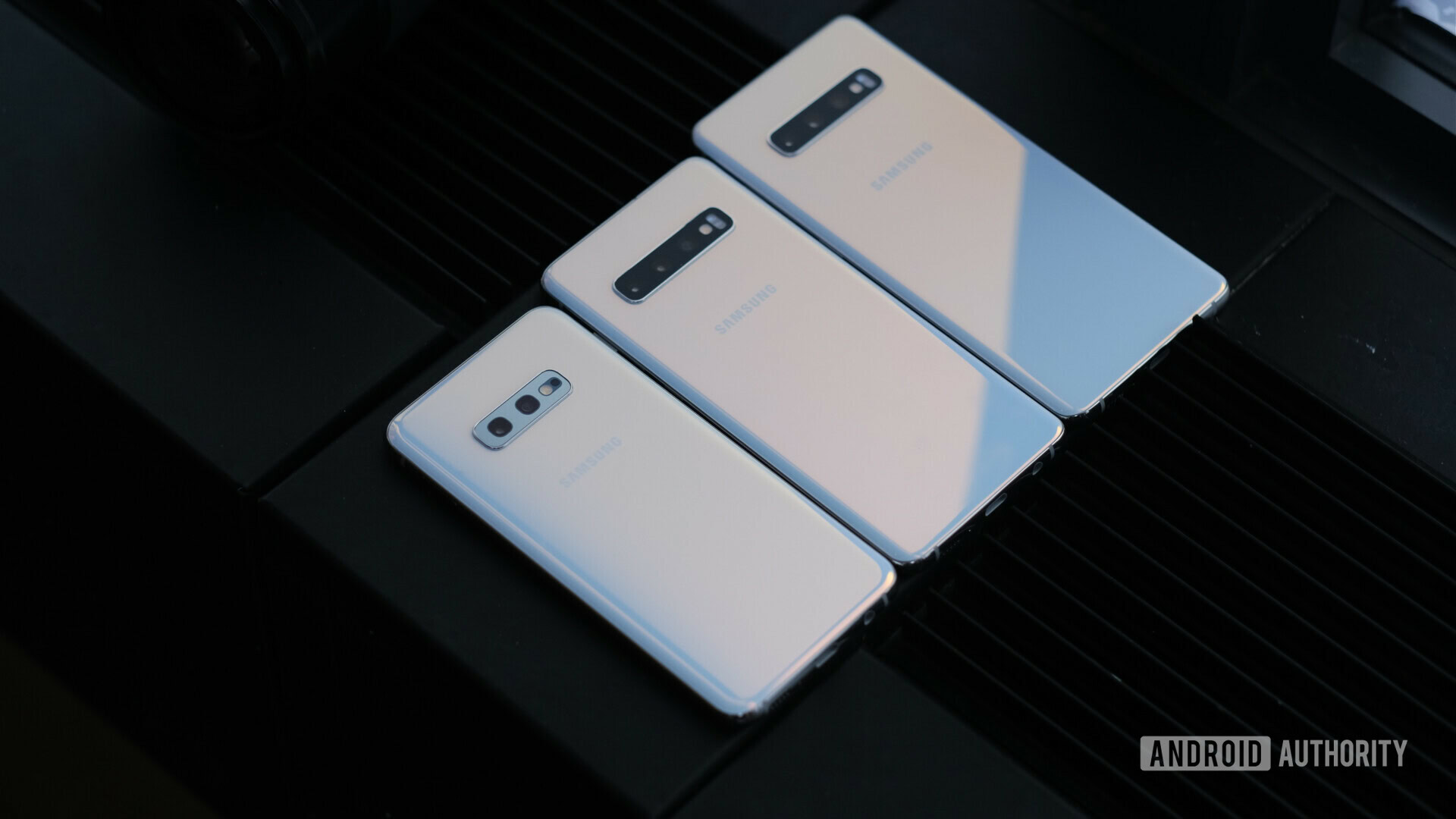
Technically there are a whopping four phones in the Galaxy S10 family and two in the Pixel 3 range, so we’ll be looking specifically at the Galaxy S10 Plus and Pixel 3 XL in this versus to see which of the two larger-sized phones comes out on top.
A lot of the points here also apply to the Pixel 3 and Galaxy S10, though. The all-new “affordable” S10e will also no doubt be a solid rival to the long-rumored Pixel 3 Lite when it finally becomes official. We’ll have to wait until Google jumps aboard the 5G bandwagon with its own 5G phone before adding the ultra-premium Galaxy S10 5G into the equation.
Samsung Galaxy S10 Plus vs Google Pixel 3 XL: Specs and features
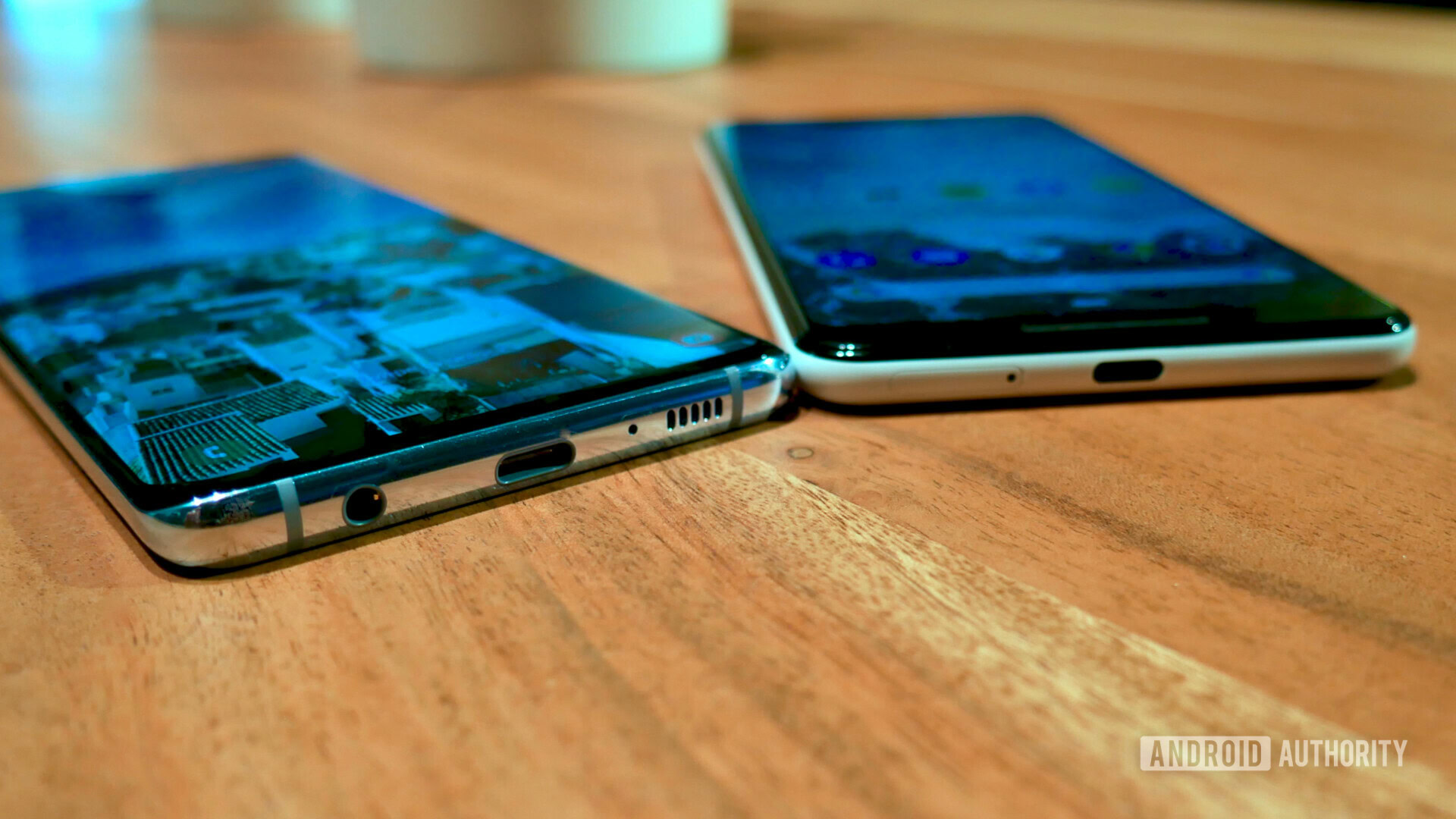
Sorry, Google. You’re about to get schooled in how to spec-out a flagship phone.
If you’ve read our Galaxy S10 specs breakdown you’ll already know this thing is an absolute monster and the Pixel 3 XL has no chance of matching on paper. Here’s the full specs comparison:
| Samsung Galaxy S10 Plus | Google Pixel 3 XL | |
|---|---|---|
Display | Samsung Galaxy S10 Plus 6.4-inch AMOLED panel 3,040 x 1,440 resolution 525 ppi 19:9 aspect ratio | Google Pixel 3 XL 6.3-inch p-OLED 1,440 x 2,960 resolution 523ppi 18.5:9 screen ratio Gorilla Glass 5 |
Processor | Samsung Galaxy S10 Plus 8nm octa-core Exynos 9820 / 7nm octa-core Snapdragon 855 | Google Pixel 3 XL Qualcomm Snapdragon 845 |
RAM | Samsung Galaxy S10 Plus 8/12GB | Google Pixel 3 XL 4GB |
Storage | Samsung Galaxy S10 Plus 128/512GB / 1TB | Google Pixel 3 XL 64GB, 128GB |
MicroSD | Samsung Galaxy S10 Plus Yes, up to 512GB | Google Pixel 3 XL No |
Cameras | Samsung Galaxy S10 Plus Rear: 16MP f/2.2 ultrawide + 12MP f/1.5 and f/2.4 dual pixel with OIS + 12MP OIS telephoto f/2.4 Front: 10MP f/1.9 dual pixel + 8MP depth sensor f/2.2 | Google Pixel 3 XL Rear: 12.2MP f/1.8 sensor, 1.4 micron pixels, OIS and EIS, spectral and flicker sensor Front: Main: 8MP standard angle (75 degree FOV) f/1.8 auto-focus sensor Secondary: 8MP wide-angle (97 degree FOV) f/2.2 fixed-focus sensor |
Battery | Samsung Galaxy S10 Plus 4,100mAh Non-removable | Google Pixel 3 XL 3,430mAh Non-removable |
Wireless charging | Samsung Galaxy S10 Plus Fast Wireless Charging 2.0 Wireless PowerShare | Google Pixel 3 XL QI wireless charging |
Security | Samsung Galaxy S10 Plus Embedded Ultrasonic fingerprint scanner. 2D face unlock. | Google Pixel 3 XL Rear fingerprint sensor |
Connectivity | Samsung Galaxy S10 Plus Wi-Fi 6 Bluetooth 5 NFC, MST Cat20 LTE, 7CA, 4x4 MIMO | Google Pixel 3 XL Wi-Fi 2.4GHz + 5GHz 802.11 a/b/g/n/ac, 2x2 MIMO, Bluetooth 5.0, NFC |
Software | Samsung Galaxy S10 Plus Android 9.0 Pie One UI | Google Pixel 3 XL Android 9.0 Pie |
Headphone jack | Samsung Galaxy S10 Plus Yes | Google Pixel 3 XL No |
IP rating | Samsung Galaxy S10 Plus IP68 | Google Pixel 3 XL IP68 |
Dimensions and weight | Samsung Galaxy S10 Plus 157.6 x 74.1 x 7.8mm 175g | Google Pixel 3 XL 76.7 x 158.0 x 7.9mm / 3.0 x 6.2 x 0.3in 184g / 6.5oz |
Under the hood, the Galaxy S10 Plus features Qualcomm’s latest flagship mobile SoC, the Snapdragon 855, backed by 8GB RAM and 128GB expandable storage and a 4,100mAh battery. The Pixel 3 XL whimpers behind with a Snapdragon 845 SoC, a measly 4GB of RAM, 64GB non-expandable storage, and a modest 3,430mAh battery.
You can up the storage to 128GB on the Pixel 3 XL, while the Galaxy S10 Plus comes in variants with either 8GB RAM and 512GB storage, or a frankly ridiculous 12GB RAM and 1TB storage. Pixel 3 XL owners get free access to three years of original quality Google Photos cloud storage, though.
Elsewhere, the Galaxy S10 Plus packs in a smorgasbord of hardware features the Pixel 3 XL has no answer for, like Wireless PowerShare for reverse wireless charging, facial recognition, a heart rate sensor, and a 3.5mm headphone jack. It even has vapor chamber cooling for keeping the heat down during gaming.
Aside from stereo front-facing speakers and the handy Active Edge pressure sensors, there isn’t a whole lot the Pixel 3 XL has over Samsung’s mega-phone. It matches the S10 Plus with an IP68 rating and wireless charging, although the latter is only really worth it with a Made by Google-certified charger.
The Galaxy S10 Plus packs in a smorgasbord of features that Google's flagship has no answer for.
Things get a little tricker in the camera department, however.
Despite sticking to just a 12.2MP single lens when every OEM was eyeing dual or triple-lens modules, the Pixel 3 XL continues the Pixel brand’s legacy of camera excellence through the magic of computational photography. You can see the magic of the Pixel 3 XL’s camera for yourself in our shootout here.
Much like with the Galaxy Note 9, Samsung is banking on raw specs to outdo the Pixel 3 XL with its latest flagship, delivering a triple-lens shooter for the first time on a Samsung Galaxy phone.
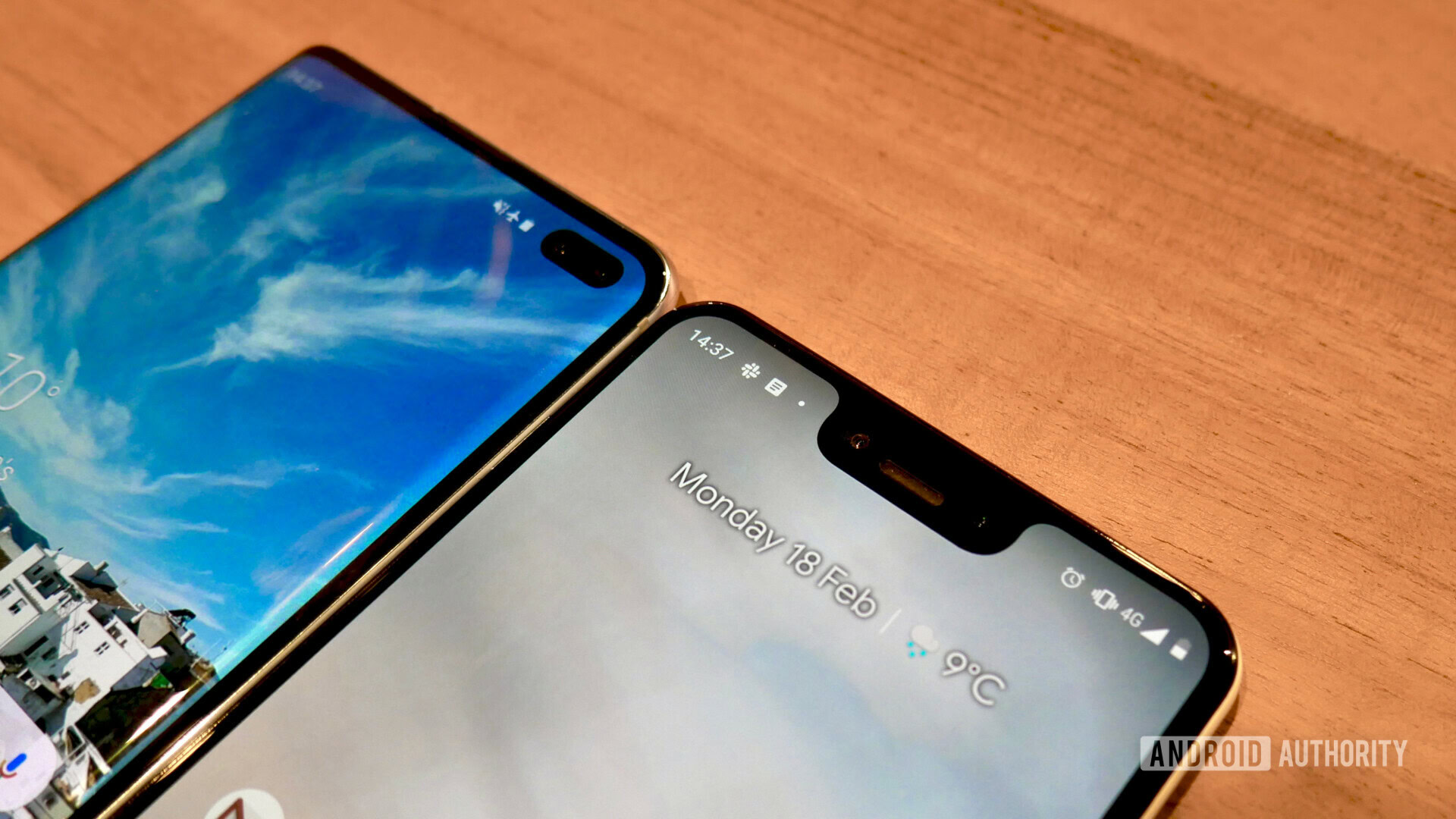
The horizontal module is made up from a 12MP telephoto lens (f/2.4), a dual-pixel 12MP wide-angle lens (f/1.5 and f/2.4) with autofocus, and a 16MP ultra-wide lens at f/2.2 with fixed focus and a 123 degree FOV. Phew.
Samsung is also bringing AI smarts to the S10 Plus via a neural processing unit (NPU), following in the footsteps of Huawei’s recent flagships. These features include scene optimization improvements and Shot Suggestion, which automatically helps with shot framing based on the scene.
Video-wise, the Galaxy S10 Plus can shoot in 4K and is the first smartphone with the option to record in HDR10+. The selfie camera on the Plus model also adds an extra 8MP depth camera to accompany the regular dual-pixel 10MP shooter.
The Galaxy S10 Plus has all the makings of yet another world-class smartphone camera. Whether or not it can produce results as effortlessly and consistently as the Pixel 3 XL is another matter entirely.
We’ll know more once we’ve put the S10 Plus through its paces for a full review, but for now, be assured that the S10 Plus’ camera is basically the Note 9 camera but even better — and Samsung’s phablet technically was the best camera phone in 2018.
Samsung Galaxy S10 Plus vs Google Pixel 3 XL: Design

Samsung has been trying to eliminate bezels on its flagship phones for some time with the elongated Infinity Displays it debuted on the Galaxy S8. The Galaxy S10 has what Samsung calls the “next evolution” of the Infinity Display, dubbed Infinity-O.
In non-jargon speak, the Galaxy S10 Plus comes with a 6.4-inch, 19:9 aspect ratio, Quad HD Plus AMOLED display with a punch hole cutout for the front facing cameras. This gives the phone an impressive overall screen-to-body ratio of 93.1 percent.
Google tentatively joined the fight with the Pixel 2 XL’s 18:9 display, but the Pixel 3 XL took things further by adding further screen real estate via a notch. There’s no getting around it — the Pixel 3 XL’s “bathtub” notch is huge and quite ugly. The Pixel 3 XL also still has a fairly sizeable chin housing a front-firing speaker.
The notch and punch hole are both inelegant solutions to the conundrum OEMs face trying to reach the true bezel-less promised land without waving goodbye to selfie cameras. Personally, I’d rather have the option to hide the notch in a simulated bezel than live with an unavoidable display hole, but otherwise there’s no denying Samsung’s Infinity-O display is far superior to the Pixel 3 XL’s 6.3-inch P-OLED panel in every conceivable way.
As for the general design, the Galaxy S10 Plus has an aluminium frame and a curved Gorilla Glass 6 rear panel only interrupted by a horizontal triple camera module. The Galaxy S10 Plus also features a dedicated Bixby button (which Samsung has hinted can be remapped). Unlike the Pixel 3 XL, you won’t find a fingerprint sensor divot anywhere on the Galaxy S10 Plus, as it houses an ultrasonic in-display fingerprint.
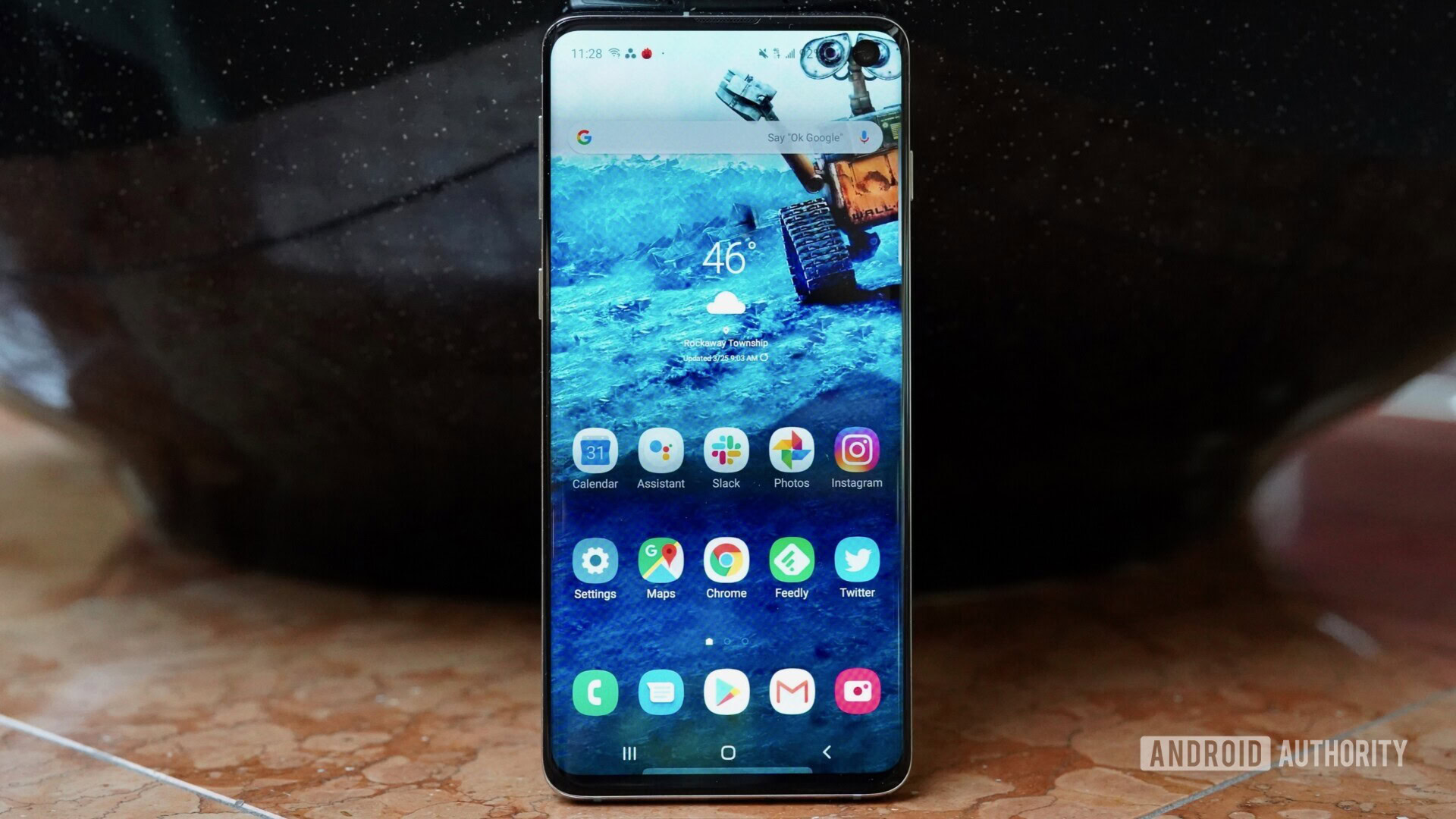
The S10’s available in Prism White, Prism Black, Prism Blue, Flamingo Pink, and Prism Green, although that last option isn’t coming to the U.S. There are also Ceramic White and Ceramic Black variants but those are exclusive to the two variants with more RAM and storage.
The Pixel 3 XL opts for a two-tone, all-glass back with a matte finish where you’ll also find a circular physical fingerprint sensor and a single camera. It just comes in Clearly White, Just Black, and Not Pink.
In terms of overall aesthetics, the Pixel 3 XL and Galaxy S10 Plus are about as different as you can get in the ever-homogeneous land of flagship phones. The Pixel 3 XL keeps things as plain and simple as possible, and the S10 Plus wants you and everyone else to know how good it looks.
Samsung Galaxy S10 Plus vs Google Pixel 3 XL: Software
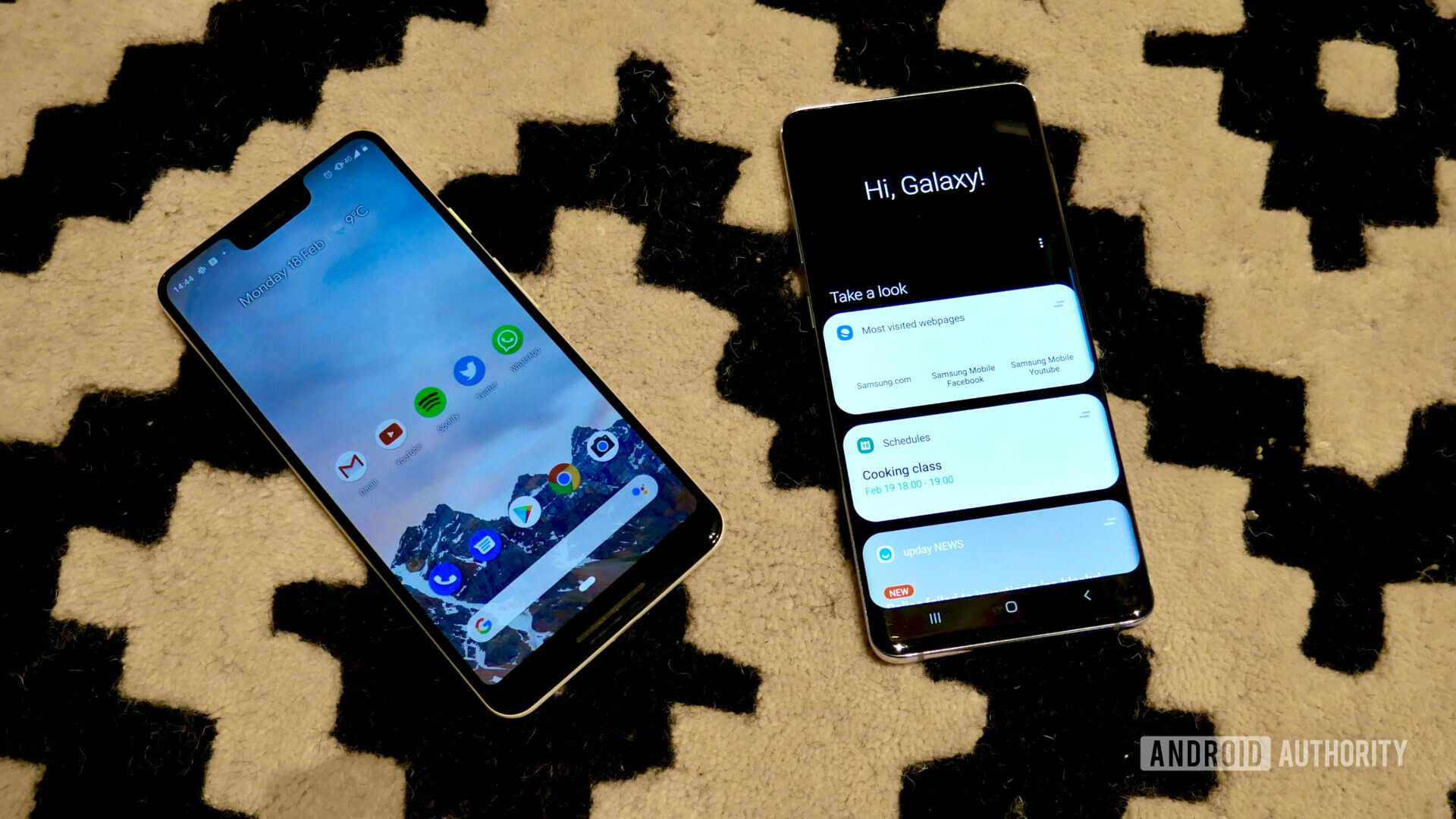
It’s fairly obvious by now that Samsung and Google clearly have wildly different views on what Android should or could be.
The Pixel Launcher is Google’s utopian vision of Android — a versatile, simple, and user friendly OS ecosystem with an increasing focus on automation and AI assistance. The Pixel 3 series is the ultimate showcase of this approach to date. As our own Kris Carlon called it in his review, the Pixel 3 is the “Android iPhone.”
On the other hand, Samsung has a history of jam-packing its Android skins with as many features as possible. That overwhelming feature and app bloat has certainly decreased in its journey from TouchWiz to Samsung Experience and now to its latest iteration, One UI.
The Samsung Galaxy S10 series is the first to run One UI out-of-the-box, powered by Android 9.0 Pie. After years of Samsung phones launching on older software versions, it’s fantastic to see the S10 runs both the latest build of Android and an all-new skin. It ensures users get the best of Android, while also benefiting from the myriad additional features of One UI.
Related: Hands-on with Samsung One UI and Android Pie on the Galaxy S9
We’ll be delving more into One UI on the Galaxy S10 Plus in the near future, but our first impression is it’s another step towards streamlining Samsung’s custom software without abandoning its feature-heavy philosophy. However, if you’re a software purist, the Pixel 3 XL will always be first in line for flagship Android updates from Google.
Elsewhere on the software front, Samsung’s phone has not one but two digital assistants — Google Assistant and Samsung Bixby. Bixby has had something of a rough ride since its clunky introduction on the Galaxy S8 series, but Samsung isn’t giving up on it anytime soon.
Bixby on the Galaxy S10 Plus enjoys the benefits of Bixby Routines, which automatically adapts to your smartphone habits to offer software suggestions. There’s always the worry these kinds of assistive features can be too aggressive, but Samsung says you’ll be able to manually adjust the settings as well. Bixby Home — not to be confused with the still-AWOL Galaxy Home smart speaker — also makes a return as the phone’s content “feed.”
While Assistant can also be summoned on the S10 Plus, Google’s companion comes into its own on the Pixel 3 XL, and Google Discover is, in my humble opinion, the only information feed actually worth using.
Samsung Galaxy S10 Plus vs Google Pixel 3 XL: Price and which should you buy?
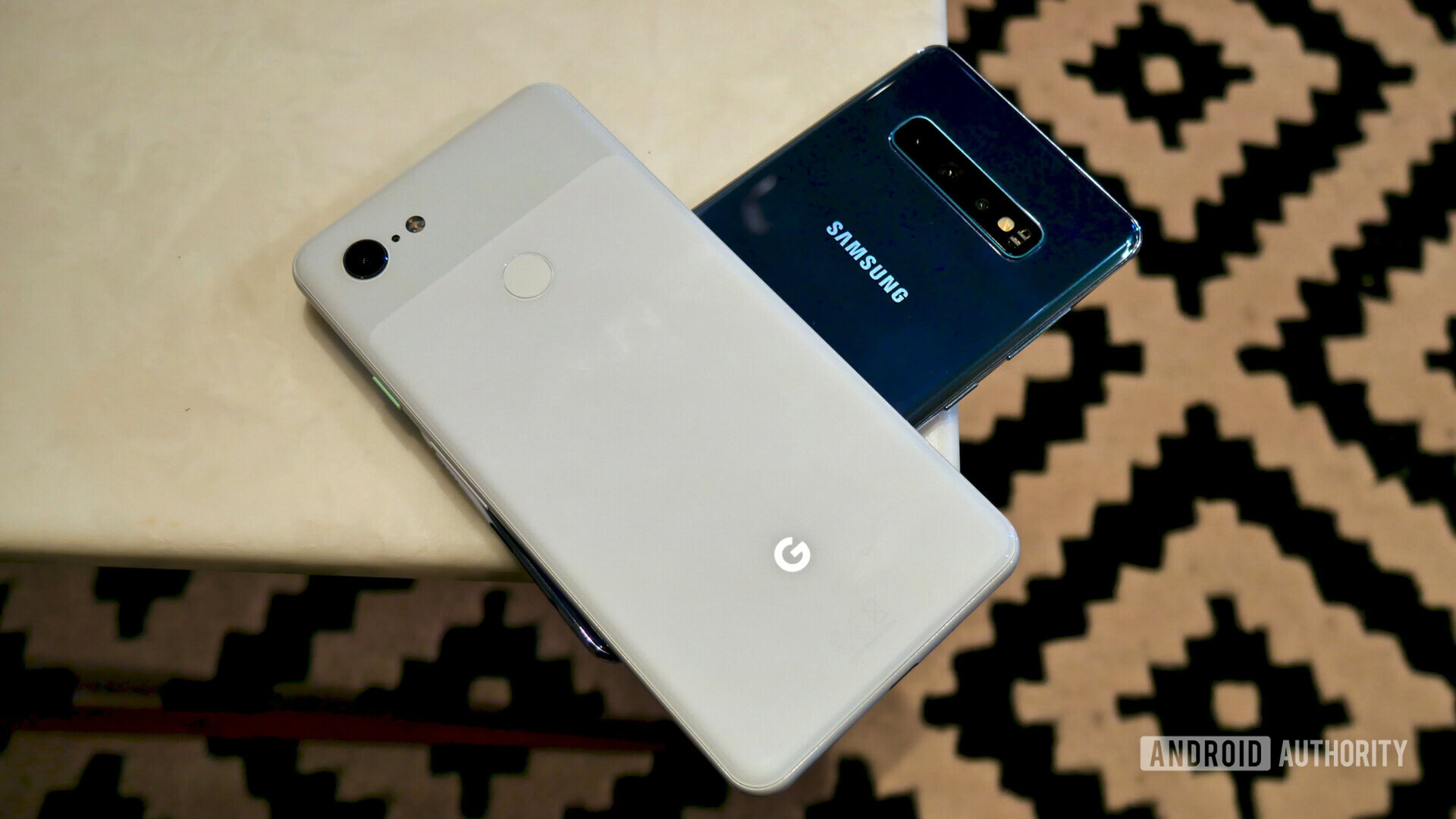
You didn’t think all of those specs would be cheap did you?
The base model Samsung Galaxy S10 Plus starts at $999, significantly more than the original $839 asking price of its direct predecessor, the Galaxy S9 Plus. The Google Pixel 3 XL, meanwhile, comes in $100 lower at $899 for the 64GB storage variant.
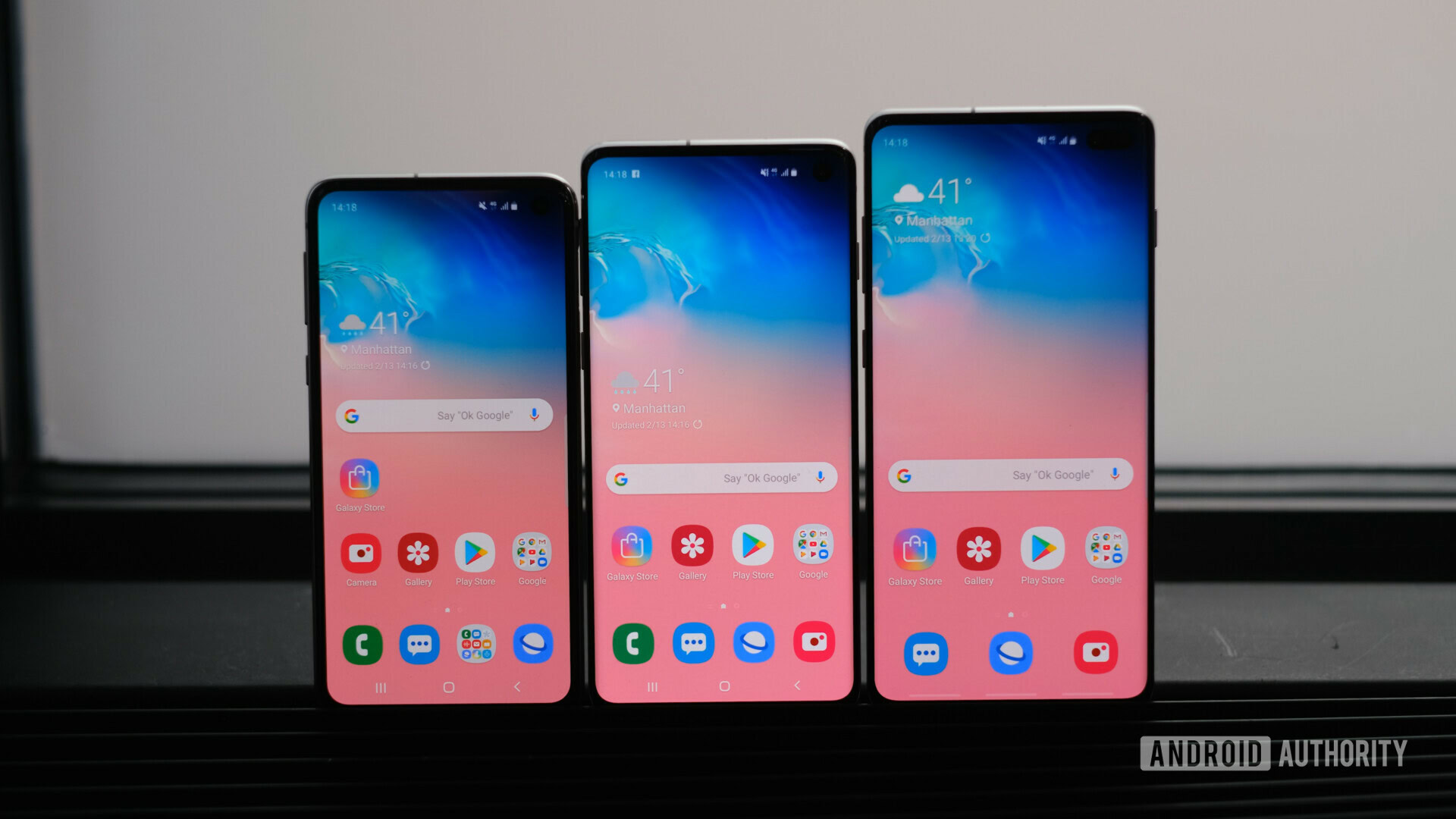
While the Pixel 3 XL is technically cheaper, neither phone is cheap by any means. The Pixel 3 XL feels more overpriced than ever considering its low RAM count and last-gen processor, especially considering you can grab the regular Galaxy S10 for the exact same price.
As we’ve seen with the recent launch of the Xiaomi Mi 9, not to mention the HONOR View 20 and the OnePlus 6T, there are far more affordable options out there with top-end specs.
If you have to cash to burn, though, these are easily two of the best Android phones money can buy. Choosing between the two is a matter of which OEM’s philosophy you buy into more.
If you’re not an Android purist, it's hard to fully recommend the Pixel 3 XL over Samsung’s latest.
The Galaxy S10 Plus epitomizes Samsung’s “no compromise” approach, from the overall build, to its powerhouse specs, to the endless ream of software and hardware features, some of which you’ll probably still be discovering months later.
The Google Pixel 3 XL eschews raw power and focuses on nailing the essentials, delivering a breathtakingly clever camera suite, a classy yet unassuming look, and a clinical, perpetually up-to-date software experience.
When it comes down to it though, if you’re not an Android purist it’s really tough to fully recommend the Pixel 3 XL over Samsung’s latest, at least for now. Until Google finally drops the price of the entire Pixel 3 series the massive disparity in overall specs will nudge many users (justifiably) towards the vanilla Galaxy S10 or the Galaxy S10 Plus.
So what’s it going to be between Samsung Galaxy S10 Plus vs Google Pixel 3 XL? Which phone do you think represents the best of Android? Let us know in the comments below!